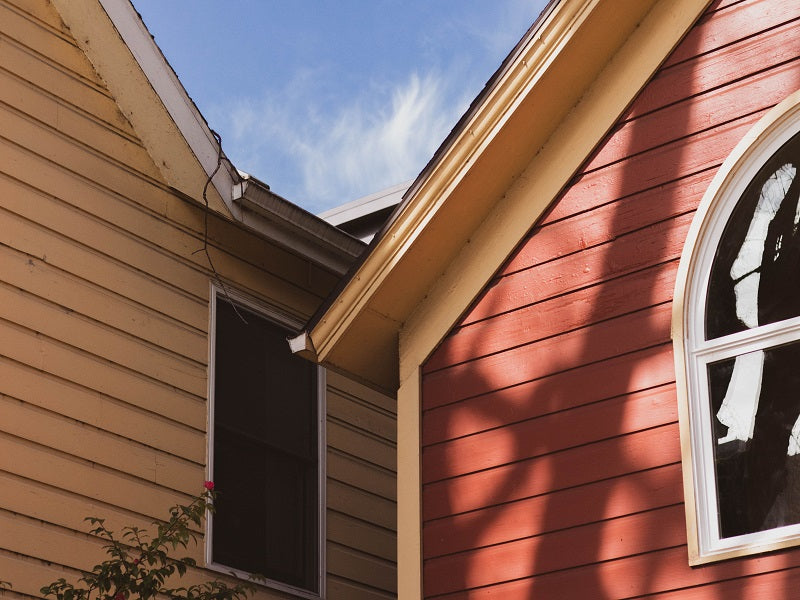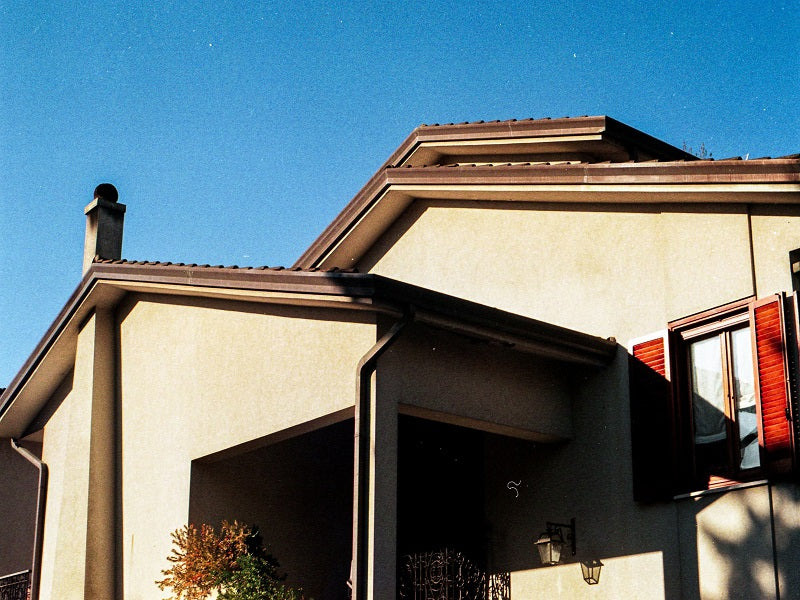When Are Gutters Not Necessary: Exploring the Need for Gutters on Houses
When are gutters not necessary: Discover if gutters are essential for your home. Explore the necessity of gutters on houses in this blog.
Gutters, the hidden protectors of our roofs, keep us dry and protected from water damage. Picture them as the vigilant guardians of your house, diverting rainfall away to keep your sanctuary safe and sound. Usually made of metal or plastic, these lines run along the sides of roofs to catch rainwater and direct it away from the building's base.
When Are Gutters Not Necessary? Do we need them? The value of these items is in their capacity to prevent water damage to your home. Besides keeping the soil from washing away, they protect your landscape and keep your property looking lovely.
Gutter systems are often neglected, which are crucial in maintaining a dry and comfortable home. So, when Are Gutters Not Necessary? Let’s find out!
Understanding the Purpose of Gutters:
Their function is obvious: to protect our homes from the constant rain pouring. The rain would fall freely to the ground with no gutters. This seemingly innocuous action may have severe consequences if left unchecked. Water can erode the soil around our houses, which might lead to structural damage. Gutters are stalwart guardians because they divert water away from the foundation, where it may otherwise weaken the structure.
Gutters prevent water damage to our houses' siding. The outside may deteriorate from the continual splattering of rain, resulting in expensive repairs. Gutters collect the water and channel it away, prolonging the life of the siding.
They are also essential in keeping our landscape in good condition. Think of a torrential downpour that is uncontained and unchecked. Soil erosion brought on by all this extra water might uproot all the plants and flowers we've worked so hard to care for in and around our houses. Gutters save the day by directing the water away from the foundation.
Factors Influencing the Need for Gutters:
Several variables affect whether gutters in a home are necessary and, if so, how successful they will be.
1. Location and local climate
An important consideration is the house's location and the local climate. Heavy rain or frequent storms may cause significant water runoff, requiring reliable gutter systems in these areas.
Installing gutters can help prevent erosion and potential foundation damage from excessive precipitation. While channels are helpful in wet and dry climates, they may be less necessary in areas with little annual rainfall.
2. Roofing Materials:
The roofing materials heavily influence the gutter installation used. Metal and asphalt roofs, which enable water to flow off quickly, require gutters to divert the water away from the home properly.
Gutter installation may not be necessary for houses with roofs constructed of porous materials like clay or wood, which may soak up rainwater.
3. slope and landscaping
Whether gutters are necessary also depends on the slope and landscaping of the property. Water runoff from a property on a steep slope might be more rapid; thus, gutters are essential for controlling the overflow and preventing soil erosion.
The landscape also influences the need for channels in the area. Gutters may not be necessary if careful landscaping and grading divert water away from the building. Guttering becomes necessary for property protection if the landscape rarely directs water away from the building.
When Are Gutters Not Necessary?| Homes That May Not Need Gutters!
There are specific scenarios and housing types where gutters aren't required, demonstrating the flexibility of design and nature in rainwater management.
1. Arid Climates with Low Rainfall:
It significantly reduces the need for gutters in dry locations with less annual precipitation. Infrequent or light rainfall in these regions reduces the potential for flooding from uncontrolled runoff.
In addition, the rapid rate of evaporation made possible by the dry environment lessens the likelihood that precipitation would cause lasting damage to the house's foundation.
Homes in dry areas typically have to find creative ways to deal with the bit of rain that falls. Methods exist, such as sloping the land around the home so that water drains away from the building's base with no gutters.
2. Homes with Specific Architectural Designs:
Several building plans may effectively handle rainfall with no gutters. Drainage systems are typically an integral part of the design of today's architectural wonders. Various roof types, such as butterfly and flat roofs, may effectively manage rainwater runoff. There is no need for gutters since the roof's form and slope channel water to designated collecting sites or provide controlled drainage.
Inherent rainwater management is also a feature of several older architectural types. Extended eaves and water channels (called "nagaya" gutters) in Japanese dwellings, for instance, efficiently divert rainwater away from the walls and foundation.
Alternative Drainage Systems for Handling Rainwater
If gutters aren't an option for your property, there are other ways to divert rainfall away from your foundation:
1. Rain Chains:
Instead of using boring old downspouts, you may use rain chains instead. They direct water from a roof to the ground, often consisting of ornate cups or links. As the water trickles down the chain, it makes a beautiful sight and calming sound.
2. Permeable Pavements:
Permeable pavements like concrete or gravel may collect and filter rainwater at residences with sufficient yard area. These permeable materials let precipitation seep into the ground rather than flow off the surface.
3. Rain Gardens:
Handling rainwater is possible with well-planned rain gardens. These gardens are placed in regions with natural runoff, enabling the plants and soil to benefit from the excess water. Rain gardens are helpful for more than just controlling water runoff; they also make outdoor spaces seem better.
Pros and Cons of Having Gutters:
Advantages of Gutters:
1. Water Management and Foundation Protection
Gutters efficiently handle rainfall by channeling it away from the home. They do this to prevent water from seeping into the foundation and weakening the house.
2. Preventing Erosion and Landscaping Damage
If the water from rainstorms isn't diverted, it may wash away soil and destroy plants in the yard. Gutters divert water away from these locations, keeping them looking nice.
3. Preserving Siding and Paint
The constant pounding of raindrops on a home's exterior might eventually wear away the paint and harm the siding. The installation of gutters and water collection can minimize repair expenses.
4. Preventing Basement Flooding
If you want to keep water out of your basement, gutters are necessary. They prevent water from leaking into the basement by channeling rainfall away from the house's foundation.
5. Reducing Soil Erosion
Gutters help keep the soil surrounding a home in good condition by directing water away from it in a regulated manner. It protects the landscaping and the stability of the property's foundation by stopping soil erosion.
Disadvantages and Challenges:
1. Installation Costs
Gutter installation might require a hefty outlay of cash. Installation, materials, and labor costs all play a role in determining the final tally. The price of high-quality materials tends to be more significant.
2. Regular Maintenance Required
Gutters are only helpful if they are regularly cleaned and maintained. Clogged drains from leaves, trash, and even insects may lead to flooding and structural damage.
3. Potential for Clogs and Blockages
Fall is the worst time of year for clogged gutters because of the amount of leaves and twigs. These obstructions prevent water from flowing and may need regular cleaning.
4. Sagging and Alignment Issues
Heavy precipitation or the accumulation of debris may cause gutters to sag or shift out of place. This compromises their functionality and aesthetics, calling for maintenance or realignment.
5. Weather-Related Challenges
Heavy snowfall or ice accumulation may strain gutters and even crack them. Regular maintenance and careful material selection can minimize these issues.
Conclusion:
When Are Gutters Not Necessary? Some houses may not need gutters. You may not need gutters if you live in a dry climate with little precipitation or if your property has a clever design for handling rainwater.
The foundation, siding, and basement are all vulnerable to water damage without gutters, especially in high-rainfall areas or houses with inefficient rainwater management. Homeowners may make better decisions about gutter installation when they fully grasp these factors.




Leave a comment
This site is protected by hCaptcha and the hCaptcha Privacy Policy and Terms of Service apply.